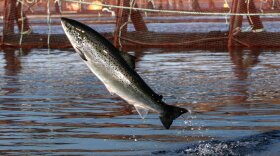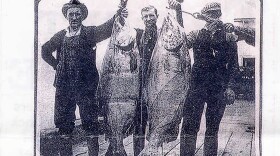
John Ryan
Good thing KUCB's fill-in reporter John Ryan was a clumsy traveler.
Otherwise his cheap microcassette recorder wouldn't have fallen out of his pocket in an Indonesian taxi, a generous BBC stringer wouldn't have lent him some professional recording gear, and he wouldn't have gotten the radio bug. But after pointing a mic at rare jungle songbirds and gong–playing grandmothers for his first radio story, there was no turning back.
In the past 15 years, he's freelanced for NPR News, Marketplace, the Christian Science Monitor and the Los Angeles Times. After working as a transportation reporter at the Seattle Daily Journal of Commerce, he got his first job in radio (and the Alaska bug) at KTOO-Juneau. For the past six years, he's been a reporter at NPR station KUOW-Seattle, where he's won regional and national awards for investigative reporting.
-
The Quinault Indian Nation in Washington state is gradually moving the village of Taholah away from a rising Pacific Ocean. Other communities in the U.S. may need to take a similar approach.
-
This brings the total of reported attacks on the Northwest power grid to 10 since November. Attacks on substations in the Pacific Northwest have heightened concerns about grid vulnerabilities.
-
The consulate closes Friday under orders from the White House. In addition, 60 Russian officials are being expelled from the U.S. because of the poisoning of a Russian ex-spy and his daughter.
-
The move comes seven months after an ill-fated fish farm collapsed, releasing as many as 250,000 of the nonnative fish into areas where wild Pacific salmon are already struggling to survive.
-
Historical photos show fishermen with chinooks almost as tall as they are. A century's worth of dam-building, overfishing, habitat loss and hatcheries has cut the size of the average fish in half.
-
Officials blame the failure of a pen near Washington's Cypress Island on high tides caused by the eclipse, but that is being questioned. Fishing boats are scrambling to catch as many as possible.
-
Member station KUCB tagged along with a meteorologist at one of America's most remote weather stations. This story originally aired on Dec. 22, 2015, on All Things Considered.
-
Twice a day, like clockwork, people release balloons around the world at the same time. These balloons are scientific tools, and the people releasing them are meteorologists.
-
Even with vacancies, most Seattle shelters don't let families stay right away. A system designed to alleviate homelessness has resulted in a bottleneck that leaves families on the streets for longer.
-
In Seattle — one of the nation's wealthiest cities — homelessness has surged over the past decade. More people are now homeless in Seattle than anywhere except New York City, Los Angeles or Las Vegas.






